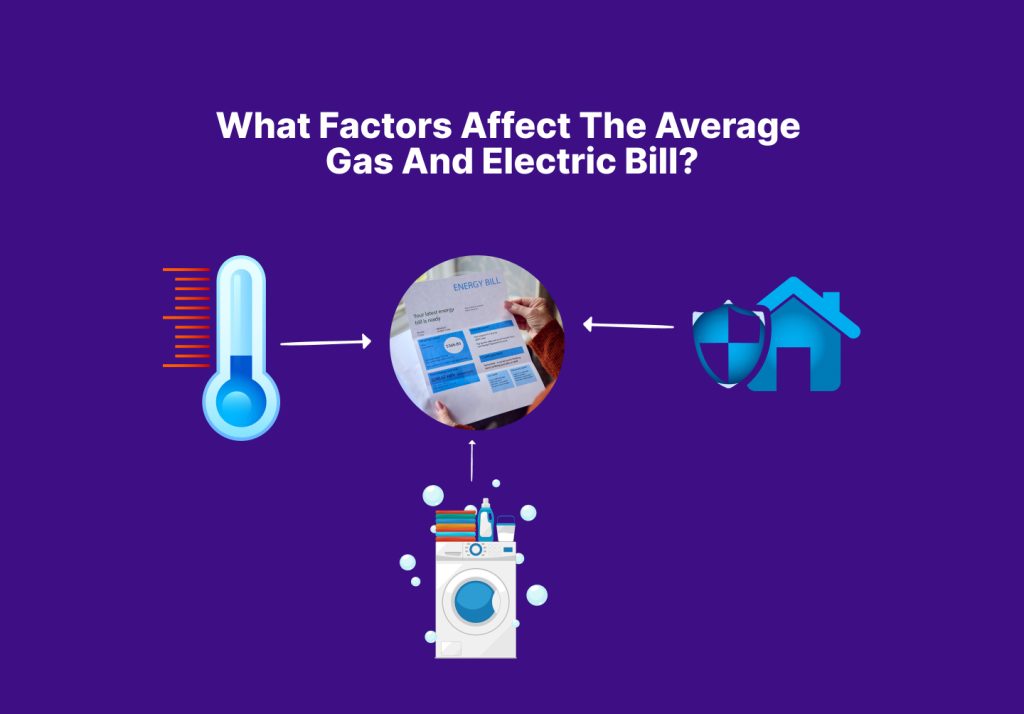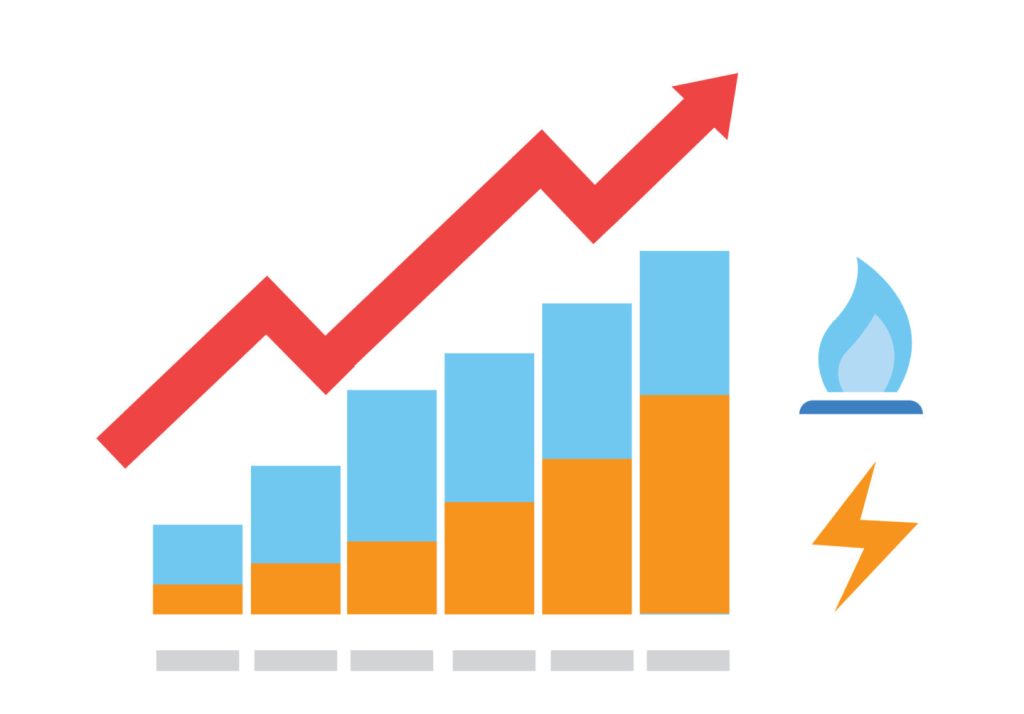
Understanding your energy bills can sometimes feel like trying to decode a foreign language. If you’ve ever looked at your gas and electric bills and wondered where all the charges are coming from or how you can reduce them, you’re certainly not alone. Energy costs in the UK can vary widely, and getting a clear grasp on what influences these costs can be incredibly helpful for managing your household budget. In this guide, we’ll explore the average gas and electric bills in the UK, discuss how they vary with house size, and provide actionable tips to help you lower your expenses. By breaking down these details, you’ll be better equipped to make informed choices and potentially save on your energy bills.
What is the average gas and electric bill by house size in the UK?
The size of your home significantly impacts your energy bills. In the UK, a smaller flat typically sees lower bills compared to a large detached house. For instance, if you’re living in a one-bedroom flat, you might expect to pay around £40-£60 per month on electricity and £30-£50 on gas. Conversely, a large family home could see monthly electricity costs of £90-£130 and gas bills in the range of £70-£110. These figures can vary based on several factors, including the efficiency of your appliances and your household’s energy consumption habits.
| House Size | Average Electric Bill per Month | Average Gas Bill per Month |
| One-bedroom flat | £40-£60 | £30-£50 |
| Two-bedroom house | £50-£70 | £40-£60 |
| Three-bedroom house | £60-£90 | £50-£80 |
| Four-bedroom house | £80-£120 | £70-£110 |
| Large family home | £90-£130 | £80-£120 |
It’s essential to understand that these averages are just that—averages. Your actual bill might be higher or lower depending on how energy-efficient your home is. Modern homes with better insulation and energy-efficient appliances will typically see lower bills. Older homes, particularly those with poor insulation, can see higher costs. Additionally, the number of occupants and their energy usage behaviors play a crucial role. A house full of energy-conscious individuals might have lower bills than one where lights and electronics are left on around the clock.
Average electric bill per month
Your monthly electric bill can be a significant part of your household expenses. On average, UK households pay around £60-£70 per month for electricity. This figure varies based on the number of occupants, the efficiency of electrical appliances, and usage patterns. For example, if you work from home, your electricity consumption will likely be higher due to prolonged use of computers, heating, or cooling systems.
Electricity bills tend to peak during the winter months when heating requirements increase. If you’re using electric heaters or even just more lighting during the shorter days, you’ll notice a spike in your bills. It’s crucial to be mindful of these seasonal changes and perhaps budget a little extra for the colder months. Moreover, advancements in technology, such as smart meters, can provide you with real-time data on your electricity usage, helping you identify peak usage times and adjust accordingly to save money.
Average gas bill per month
Gas bills are another substantial component of your monthly energy expenses. On average, UK households pay around £50-£60 per month for gas. Similar to electricity, this amount can vary widely based on factors such as the size of your home, the efficiency of your heating system, and your usage habits.
Gas usage typically increases during the winter months due to the need for heating. If you have a gas boiler or gas-powered central heating, you’ll see a rise in your bills as the temperature drops. Insulating your home and maintaining your heating system can help manage these costs effectively. Regular servicing of your boiler, bleeding your radiators, and ensuring your home is draught-proof can make a noticeable difference in your gas consumption.
Average energy bill per month
Combining both gas and electricity, the average energy bill for UK households is approximately £110-£130 per month. This combined figure gives you a more comprehensive view of your total energy expenses. Understanding this can help you plan your finances better and identify areas where you might be able to reduce usage and save money.
An integrated approach to energy savings, such as using a programmable thermostat, switching to energy-efficient appliances, and adopting good energy habits, can significantly lower your overall energy costs. Additionally, exploring renewable energy options like solar panels could provide long-term savings and reduce your dependence on the grid.
How are energy bills calculated

Understanding how your energy bills are calculated can be the first step towards managing and potentially reducing them. Energy bills are typically composed of two main components: unit rates and the standing charge. The unit rate is the amount you pay per kilowatt-hour (kWh) of energy you consume. This rate can vary depending on your energy provider and tariff plan. The standing charge is a fixed daily fee that covers the cost of delivering energy to your home, maintaining the network, and other administrative expenses.
Unit Rates
Unit rates are a crucial part of your energy bill. They represent the cost per kilowatt-hour (kWh) of energy consumed. For electricity, this rate can range from 15p to 20p per kWh, depending on your provider and tariff. Gas unit rates are generally lower, averaging around 3p to 5p per kWh. It’s essential to compare unit rates when selecting an energy provider, as even a small difference can add up over time.
If you’re on a variable tariff, your unit rates can fluctuate based on market conditions. Conversely, fixed-rate tariffs lock in your unit rate for a set period, providing stability and protection against price hikes. However, if market prices fall, you might miss out on potential savings. Therefore, understanding your consumption patterns and staying informed about market trends can help you make an informed decision.
Standing Charge
The standing charge is the fixed daily fee you pay regardless of how much energy you consume. This charge covers the costs of maintaining the energy network, including infrastructure and administrative expenses. The standing charge for electricity typically ranges from 20p to 30p per day, while for gas, it can be around 10p to 20p per day.
While the standing charge might seem like a small amount, it can add up to a significant portion of your bill over time. Some providers offer tariffs with lower standing charges but higher unit rates, and vice versa. Understanding the balance between these charges can help you choose a plan that best suits your consumption habits and potentially save money.
Energy providers also take into account factors such as your geographical location and the type of meter installed in your home. Smart meters, for example, provide more accurate readings, which can help in precise billing and avoiding overestimations. Additionally, some providers offer time-of-use tariffs, where the unit rate varies depending on the time of day. Understanding these elements can help you choose the most cost-effective plan for your household.
Electricity cost calculator
An electricity cost calculator can be a valuable tool in managing your energy expenses. By inputting details such as your appliance wattage, usage duration, and unit rate, you can estimate the cost of running various devices in your home. For instance, a typical 1000-watt electric heater running for three hours a day would cost around 60p per day, assuming an average unit rate of 20p per kWh.
Using an electricity cost calculator can help you identify which appliances are the most energy-intensive and adjust your usage accordingly. It’s also an excellent way to experiment with different scenarios, such as reducing usage or switching to energy-efficient devices, to see the potential impact on your bills.
What is the best way to pay for your electric bill?
Choosing the best payment method for your electric bill can also influence your overall energy costs. Many energy providers offer discounts for customers who pay by direct debit. This method ensures your bills are paid automatically each month, which can help you avoid late payment fees and potentially lower your overall costs.
Some providers also offer online account management tools that allow you to track your usage, view past bills, and make payments conveniently. Prepayment meters are another option, allowing you to pay for energy as you use it, which can help with budgeting. However, prepayment tariffs are often more expensive than standard credit tariffs.
What is a Kilowatt hour (kWh)?
A kilowatt-hour (kWh) is a unit of energy measurement that represents the amount of energy used when a 1000-watt appliance runs for one hour. For example, if you use a 2000-watt heater for half an hour, it consumes 1 kWh of energy. Understanding kWh is crucial for grasping how your energy consumption translates into your energy bills.
Energy providers use kWh to calculate your energy usage and subsequently your bill. Monitoring your kWh consumption can help you identify which appliances or activities are the most energy-intensive, allowing you to make informed decisions about reducing usage and saving money.
What factors affect the average gas ad electric bill?
Several factors influence the average gas and electric bill. Here are some key ones:
1. Weather Conditions: Weather plays a significant role in energy consumption. During colder months, gas usage typically increases due to heating needs, whereas in the summer, electricity consumption might rise due to cooling systems like fans or air conditioners.
2. Home Insulation: The quality of your home’s insulation directly impacts how much energy you need to heat or cool your home. Well-insulated homes retain heat better in the winter and stay cooler in the summer, leading to lower energy bills.
3. Number of Occupants: More people living in a house generally means higher energy consumption, as there are more appliances in use, more heating or cooling needed, and more hot water consumed.
4. Energy Efficiency of Appliances: Modern, energy-efficient appliances use less power and can significantly reduce your energy bills. For example, LED bulbs consume much less electricity than traditional incandescent bulbs.
5. Lifestyle and Habits: Your daily habits, such as how often you use high-energy appliances like washing machines, dishwashers, and electric ovens, can significantly affect your energy bills. Simple changes, like turning off lights when not in use or unplugging devices, can help lower your costs.
6. Type of Heating System: The type and efficiency of your heating system (e.g., gas boiler, electric heater, or heat pump) can greatly influence your energy bills. Regular maintenance of heating systems can also improve efficiency and reduce costs.
7. Tariff Plan: The energy tariff you’re on, whether it’s fixed, variable, or time-of-use, will affect your energy bills. Comparing different plans and switching to one that better suits your usage patterns can lead to savings.
How to lower energy bills to save money?
1. Turn Off Lights and Unplug Devices: By turning off lights and unplugging devices when they are not in use, you can significantly cut down on unnecessary energy consumption. Many appliances continue to draw power even when turned off, known as standby power, which adds up over time. Establishing a routine of switching off lights and unplugging electronics or using power strips that can be turned off all at once helps to eliminate this phantom load and reduce your electricity bill.
2. Use Energy-Efficient Bulbs: Replacing traditional incandescent bulbs with energy-efficient LED bulbs is a straightforward way to lower your electricity consumption. LED bulbs use up to 80% less energy than incandescent bulbs and have a much longer lifespan, which means fewer replacements and less waste. Although LEDs may have a higher upfront cost, the long-term savings on your energy bill and reduced need for replacements make them a cost-effective choice.
3. Invest in Energy-Efficient Appliances: Upgrading to energy-efficient appliances can lead to substantial savings on your energy bills. These modern appliances are designed to use less energy while maintaining or improving performance compared to older models. While the initial purchase cost might be higher, the savings on energy consumption over time often outweigh this expense. Additionally, many energy-efficient appliances come with rebates or incentives that can offset the upfront investment.
4. Improve Home Insulation: Proper home insulation helps to keep your home at a consistent temperature, reducing the need for heating and cooling. By insulating walls, roofs, and floors, and sealing gaps around windows and doors, you can prevent heat loss in winter and keep your home cooler in summer. This improvement leads to lower energy use for heating and cooling, thus decreasing your overall energy bills while enhancing comfort.
5. Use a Programmable Thermostat: A programmable thermostat allows you to set specific temperatures for different times of the day, ensuring that you’re not wasting energy when you’re not home or during the night. By programming the thermostat to lower the temperature when you’re away or sleeping, and to warm up before you return home, you can manage your heating and cooling more efficiently and save money on your energy bills.
6. Regular Maintenance: Regular maintenance of your heating and cooling systems is crucial for maintaining their efficiency and extending their lifespan. This includes having your boiler serviced annually, bleeding radiators to remove trapped air, and ensuring there are no obstructions that could impede heat distribution. Well-maintained systems operate more efficiently, leading to lower energy consumption and reduced costs over time.
7. Monitor Your Usage: Using smart meters or energy monitoring devices helps you track your energy consumption in real-time and identify high-usage patterns. This information allows you to adjust your energy habits and usage, such as reducing power use during peak times or shifting usage to off-peak periods if you have a time-of-use tariff. By being aware of your consumption, you can make more informed decisions and potentially lower your energy bills.
What are energy bills so high right now?
Energy bills have been on the rise due to a combination of factors. Global energy prices have increased, partly due to geopolitical tensions and disruptions in supply chains. The UK’s dependence on natural gas for heating and electricity generation has also made it vulnerable to fluctuations in gas prices. Additionally, extreme weather events have led to higher demand for energy, further driving up costs. The transition to renewable energy sources, while necessary for sustainability, also involves significant upfront investments that can impact energy prices.
What should I do if I have a billing discrepancy?
If you encounter discrepancies in your energy bill, it’s important to address them promptly to avoid potential overcharges. Start by checking your meter reading against the reading on your bill to ensure they match. This step helps to confirm whether the discrepancy is due to an incorrect reading or billing error.
If your meter reading appears accurate but the bill still seems off, contact your energy provider for clarification. They can review your account, check for any errors, and provide explanations or corrections if needed. Most providers have dedicated customer service teams to handle billing inquiries and disputes.
Also, review your tariff to ensure you’re on the correct plan for your usage. Sometimes, discrepancies can arise if your tariff has changed or if you’re inadvertently on a plan that doesn’t suit your consumption pattern. Confirming that your tariff aligns with your current needs can help resolve any billing issues and prevent future discrepancies.
How can I use less gas and electricity?
Reducing your gas and electricity usage involves adopting a combination of energy-efficient practices and mindful habits. Begin by using energy-efficient lighting and appliances, such as LED bulbs and Energy Star-rated appliances, which consume less power and reduce your overall energy usage.
Monitor your energy consumption with smart meters or energy tracking devices. These tools provide real-time data on your energy use, allowing you to identify high-consumption periods and make adjustments accordingly. By understanding your usage patterns, you can make more informed decisions about when and how to use energy.
Adjusting your daily habits can also lead to significant savings. Lower your thermostat by a few degrees during the winter and dress warmly to stay comfortable. Use less hot water by taking shorter showers and washing clothes in cold water when possible. Being mindful of your appliance use, such as only running dishwashers and washing machines with full loads, can further reduce your gas and electricity consumption.
How do I compare energy providers?
Comparing energy providers is a crucial step in finding the best deal for your needs. To start, use comparison tools and websites like Docalla, which can help you identify the most competitive rates and plans based on your location and usage patterns. At Docalla, we offer a side-by-side comparison of various providers’ tariffs, highlighting differences in unit rates, standing charges, and contract terms.
Next, check reviews and ratings from other customers to gauge the quality of service each provider offers. Customer feedback can provide insights into the provider’s reliability, customer support, and overall satisfaction. Look for reviews on independent review sites and forums to get an unbiased view.
When comparing tariffs, focus on the details of each offer, including the unit rates (the cost per kWh of energy used), standing charges (fixed daily fees for energy delivery), and contract terms. Some providers may offer competitive unit rates but have high standing charges or long-term contracts with penalties for early termination. Assess all aspects of the tariff to find the one that best matches your usage patterns and financial preferences.
Conclusion
Handling energy bills might seem like a challenge, but with the right information and a proactive approach, you can take control of your costs and find ways to save. By understanding the factors that affect your average gas and electric bills, you can identify practical steps to reduce your expenses. From improving your home’s insulation and investing in energy-efficient appliances to adjusting your daily habits, there are numerous strategies you can employ. Don’t forget that comparing energy providers using tools like Docalla can also help you find the most competitive rates. Armed with this knowledge, you’re in a strong position to make smarter decisions about your energy use, ultimately leading to more manageable and predictable bills.




